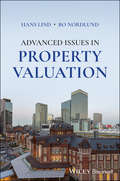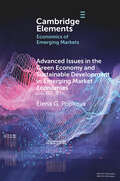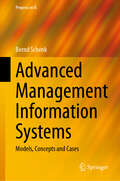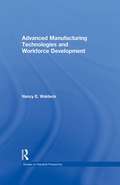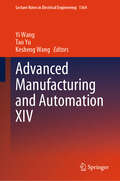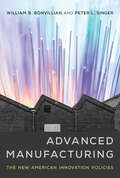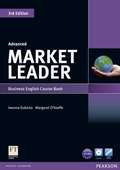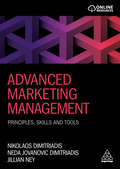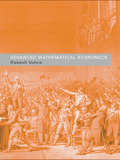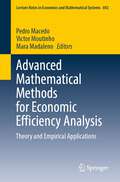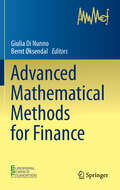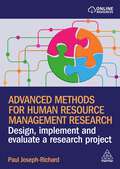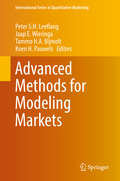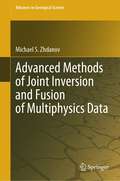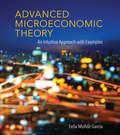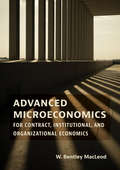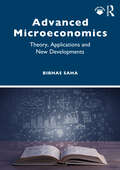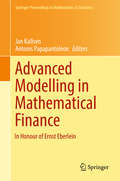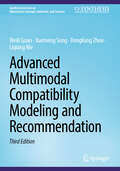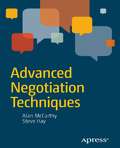- Table View
- List View
Advanced Issues in Partial Least Squares Structural Equation Modeling
by Marko Sarstedt Dr Joe Hair Dr Christian M. Ringle Dr Siegfried P. GuderganWritten as an extension of A Primer on Partial Least Squares Structural Equation Modeling (PLS-SEM) Second Edition, this easy-to-understand, practical guide covers advanced content on PLS-SEM to help students and researchers apply techniques to research problems and accurately interpret results. Authors Joseph F. Hair, Jr., Marko Sarstedt, Christian Ringle, and Siegfried P. Gudergan provide a brief overview of basic concepts before moving to the more advanced material. Offering extensive examples on SmartPLS 3 software and accompanied by free downloadable data sets, the book emphasizes that any advanced PLS-SEM approach should be carefully applied to ensure that it fits the appropriate research context and the data characteristics that underpin the research.
Advanced Issues in Property Valuation
by Hans Lind Bo NordlundDiscover an insightful new text covering advanced problems in real property valuation In Advanced Issues in Property Valuation, real estate valuation experts and authors Hans Lind and Bo Nordlund provide a deep understanding of the concepts, theories, methods and controversies in property valuation. The book introduces readers to controversies and discussions in real estate valuation, including the relevance of market value for valuation for lending purposes, how uncertainty in property valuations should be interpreted, and the relationship between market value and fair value in financial reporting. Readers will also benefit from the inclusion of: A thorough introduction to the concepts, theories, methods and problems in real estate property valuation An exploration of the relevance of market value for valuation for lending purposes A practical discussion of how uncertainty in property valuations should be interpreted A concise treatment of the relationship between market value and fair value in financial reporting An examination of how concerns about sustainability and other structural changes can affect property valuation Perfect for graduate level students in courses involving valuation or real estate, Advanced Issues in Property Valuation is also an excellent resource for real estate practitioners who wish to update and deepen their knowledge about property valuation.
Advanced Issues in the Green Economy and Sustainable Development in Emerging Market Economies (Elements in the Economics of Emerging Markets)
by Elena G. PopkovaThis Element goes far beyond economic theory. It will also be of interest to representatives of the environmental sciences due to its focus on the “green” economy and sustainable development. It will also be interesting to the representatives of the social sciences, as it takes into account the peculiarities of emerging market economies. Learning from the COVID-19 pandemic makes this Element interesting from a health economics perspective.
Advanced Leadership Field Perspectives: Detroit
by Rosabeth Moss Kanter Ai-Ling Jamila MaloneIndustry and Background Note
Advanced Leadership Field Perspectives: Shanghai
by William C. Kirby Erica M ZendellIndustry and Background Note
Advanced Management Information Systems: Models, Concepts and Cases (Progress in IS)
by Bernd SchenkThis is a textbook for advanced courses on Management Information Systems (MIS). It bridges the gap between theoretical frameworks and practical applications, offering insights into both foundational principles and emerging trends. Covering topics such as artificial intelligence, data analytics, enterprise architecture, and information systems governance, the book explores the multifaceted nature of MIS and its transformative impact on modern organizations. Each chapter integrates foundational IS research with the latest insights, applying these to case studies to ensure both relevance and academic rigor. Topics include business-IT alignment, data-driven decision-making, and the ethical challenges of managing information systems in today&’s complex, interconnected world. Through a combination of theoretical models, practical frameworks, and real-world examples, this book equips readers with the tools needed to navigate the evolving MIS landscape. The book is designed for advanced learners, building upon foundational MIS concepts to provide deeper insights into the field. It is particularly valuable for students pursuing a bachelor&’s degree in Information Systems or related disciplines, as well as for those enrolled in master&’s programs focused on IS. Additionally, professionals looking to enhance their expertise will find this book a useful resource. Since it does not cover introductory topics in detail, a basic understanding of the field of information systems is recommended for fully engaging with the material.
Advanced Manufacturing Technologies and Workforce Development (Studies on Industrial Productivity: Selected Works)
by Nancy E. WaldeckFirst Published in 2000. Routledge is an imprint of Taylor & Francis, an informa company.
Advanced Manufacturing and Automation XIII (Lecture Notes in Electrical Engineering #1154)
by Yi Wang Kesheng Wang Tao YuThe book is a compilation of selected papers from the 13th International Workshop of Advanced Manufacturing and Automation (IWAMA 2023), held in Shanghai University of Engineering Science, China on 15 - 16 October, 2023. Topics focusing on novel techniques for manufacturing and automation in Industry 4.0 are now vital factors for the maintenance and improvement of the economy of a nation and the quality of life. It will help academic researchers and engineers to implement the concept, theory and methods in Industry 4.0 which has been a hot topic. These proceedings will make valuable contributions to academic researchers, engineers in the industry for the challenges in the 4th industry revolution and smart factories.
Advanced Manufacturing and Automation XIV (Lecture Notes in Electrical Engineering #1364)
by Yi Wang Kesheng Wang Tao YuThe book is a compilation of selected papers from the 14th International Workshop of Advanced Manufacturing and Automation (IWAMA 2024), held in Kunming University of Science and Technology, China on 11-12 October, 2024. Topics focusing on novel techniques for manufacturing and automation in Industry 4.0 are now vital factors for the maintenance and improvement of the economy of a nation and the quality of life. It will help academic researchers and engineering to implement the concept, theory and methods in Industry 4.0 which has been a hot topic. These proceedings will make valuable contributions to academic researchers, engineers in the industry for the challenges in the 4th industry revolution and smart factories.
Advanced Manufacturing: The New American Innovation Policies (The\mit Press Ser. #Vol. 1)
by William B. Bonvillian Peter L. SingerHow to rethink innovation and revitalize America's declining manufacturing sector by encouraging advanced manufacturing, bringing innovative technologies into the production process.The United States lost almost one-third of its manufacturing jobs between 2000 and 2010. As higher-paying manufacturing jobs are replaced by lower-paying service jobs, income inequality has been approaching third world levels. In particular, between 1990 and 2013, the median income of men without high school diplomas fell by an astonishing 20% between 1990 and 2013, and that of men with high school diplomas or some college fell by a painful 13%. Innovation has been left largely to software and IT startups, and increasingly U.S. firms operate on a system of “innovate here/produce there,” leaving the manufacturing sector behind. In this book, William Bonvillian and Peter Singer explore how to rethink innovation and revitalize America's declining manufacturing sector. They argue that advanced manufacturing, which employs such innovative technologies as 3-D printing, advanced material, photonics, and robotics in the production process, is the key.Bonvillian and Singer discuss transformative new production paradigms that could drive up efficiency and drive down costs, describe the new processes and business models that must accompany them, and explore alternative funding methods for startups that must manufacture. They examine the varied attitudes of mainstream economics toward manufacturing, the post-Great Recession policy focus on advanced manufacturing, and lessons from the new advanced manufacturing institutes. They consider the problem of “startup scaleup,” possible new models for training workers, and the role of manufacturing in addressing “secular stagnation” in innovation, growth, the middle classes, productivity rates, and related investment. As recent political turmoil shows, the stakes could not be higher.
Advanced Market Leader: Business Leader Course Book 3rd edition
by Iwonna Dubicka Margaret O'Keeffe'Market Leader' is the major business English course for tomorrow's business leaders. Incorporating material from the Financial Times, it brings real business issues right into the classroom.
Advanced Marketing Management: Principles, Skills and Tools
by Dr Nikolaos Dimitriadis Neda Jovanovic Dimitriadis Dr Jillian NeyMarketing as a practice is facing unprecedented challenges: a changing media landscape, an increasingly complex customer journey, innovative technologies, start-ups which disrupt traditional channels and a new generation of tech-savvy clients. How should students and practitioners adapt to this shifting landscape and address the skills gap that many of today's marketers face? Advanced Marketing Management prepares students for this new world of marketing. Since traditional marketing approaches fail to provide convincing solutions to modern business realities, a new approach is urgently needed if marketers are to regain trust within their organizations. Using contemporary examples, business case studies and supporting pedagogy, Advanced Marketing Management will provide a critical exploration into the more advanced aspects of marketing management, including the gap that exists between formal marketing literature and real-world practice, discussion of multidisciplinary tools, and the crucial evolution of the '4Ps'. Summarizing a large body of literature and academic research on new developments, this book is the go-to guide for students, lecturers and practitioners, wanting to succeed as modern marketers.
Advanced Mathematical Economics (Routledge Advanced Texts in Economics and Finance)
by Rakesh V. VohraThis concise textbook presents students with all they need for advancing in mathematical economics. Detailed yet student-friendly, Vohra's book contains chapters in, amongst others: * Feasibility * Convex Sets * Linear and Non-linear Programming* Lattices and Supermodularity. Higher level undergraduates as well as postgraduate students in mathematical economics will find this book extremely useful in their development as economists.
Advanced Mathematical Methods for Economic Efficiency Analysis: Theory and Empirical Applications (Lecture Notes in Economics and Mathematical Systems #692)
by Pedro Macedo Victor Moutinho Mara MadalenoEconomic efficiency analysis has received considerable worldwide attention in the last few decades, with Stochastic Frontier Analysis (SFA) and Data Envelopment Analysis (DEA) establishing themselves as the two dominant approaches in the literature. This book, by combining cutting-edge theoretical research on DEA and SFA with attractive real-world applications, offers a valuable asset for professors, students, researchers, and professionals working in all branches of economic efficiency analysis, as well as those concerned with the corresponding economic policies. The book is divided into three parts, the first of which is devoted to basic concepts, making the content self-contained. The second is devoted to DEA, and the third to SFA. The topics covered in Part 2 range from stochastic DEA to multidirectional dynamic inefficiency analysis, including directional distance functions, the elimination and choice translating algorithm, benefit-of-the-doubt composite indicators, and internal benchmarking for efficiency evaluations. Part 3 also includes exciting and cutting-edge theoretical research on e.g. robustness, nonparametric stochastic frontier models, hierarchical panel data models, and estimation methods like corrected ordinary least squares and maximum entropy.
Advanced Mathematical Methods for Finance
by Giulia Di Nunno Bernt ØksendalThis book presents innovations in the mathematical foundations of financial analysis and numerical methods for finance and applications to the modeling of risk. The topics selected include measures of risk, credit contagion, insider trading, information in finance, stochastic control and its applications to portfolio choices and liquidation, models of liquidity, pricing, and hedging. The models presented are based on the use of Brownian motion, Lévy processes and jump diffusions. Moreover, fractional Brownian motion and ambit processes are also introduced at various levels. The chosen blend of topics gives an overview of the frontiers of mathematics for finance. New results, new methods and new models are all introduced in different forms according to the subject. Additionally, the existing literature on the topic is reviewed. The diversity of the topics makes the book suitable for graduate students, researchers and practitioners in the areas of financial modeling and quantitative finance. The chapters will also be of interest to experts in the financial market interested in new methods and products. This volume presents the results of the European ESF research networking program Advanced Mathematical Methods for Finance.
Advanced Medical Technology Corp.
by Thomas R. Piper Steven RogersA loan officer must decide whether to lend $8 million to a rapidly growing high technology company. The company has had a series of relationships with three other banks. Reports from loan officers at these banks are mixed and raise questions as to the ease with which a relationship would proceed. The full range of issues must be considered in evaluating the credit worthiness (character, collateral, capacity, conditions, pricing). The loan officer must also determine how much weight to place on a comfort letter from a major pharmaceutical firm.
Advanced Methods for Human Resource Management Research: Design, Implement and Evaluate a Research Project
by Paul Joseph-RichardUnderstanding and applying research methods is a key skill in human resource management. This new textbook shows how to successfully complete a research project across the HR function.Advanced Methods for Human Resource Management Research provides a practice-based approach to planning and implementing research projects. Each chapter focuses on one HRM practice and a 'Method in Focus' feature that shows how a particular method could be used for researching that practice. This enables postgraduate Research Methods students to gain an understanding of how research may be most effectively conducted for different aspects of HR, from recruitment, selection and people analytics to learning and development, sustainable HRM and employee wellbeing.This book offers comprehensive guidance on what kinds of questions can be asked and the application of current designs and methods. Readers will learn how to conduct both qualitative and quantitative research, such as interviews and literature reviews, using Big Data, social media and visuals, as well as creating cross-country designs to engage international participants. It is supported by learning outcomes, real-world examples, discussion questions and 'ethical dilemma' exercises to develop critical understanding of the material. Online resources include lecturer slides, annotated web links, further reading and new reflective questions for students.This textbook is written for postgraduate HR students taking Research Methods modules as part of their degree.
Advanced Methods for Modeling Markets (International Series in Quantitative Marketing)
by Peter S. H. Leeflang Jaap E. Wieringa Koen H. Pauwels Tammo H.A BijmoltThis volume presents advanced techniques to modeling markets, with a wide spectrum of topics, including advanced individual demand models, time series analysis, state space models, spatial models, structural models, mediation, models that specify competition and diffusion models. It is intended as a follow-on and companion to Modeling Markets (2015), in which the authors presented the basics of modeling markets along the classical steps of the model building process: specification, data collection, estimation, validation and implementation. This volume builds on the concepts presented in Modeling Markets with an emphasis on advanced methods that are used to specify, estimate and validate marketing models, including structural equation models, partial least squares, mixture models, and hidden Markov models, as well as generalized methods of moments, Bayesian analysis, non/semi-parametric estimation and endogeneity issues. Specific attention is given to big data. The market environment is changing rapidly and constantly. Models that provide information about the sensitivity of market behavior to marketing activities such as advertising, pricing, promotions and distribution are now routinely used by managers for the identification of changes in marketing programs that can improve brand performance. In today's environment of information overload, the challenge is to make sense of the data that is being provided globally, in real time, from thousands of sources. Although marketing models are now widely accepted, the quality of the marketing decisions is critically dependent upon the quality of the models on which those decisions are based. This volume provides an authoritative and comprehensive review, with each chapter including: #65533; an introduction to the method/methodology #65533; a numerical example/application in marketing #65533; references to other marketing applications #65533; suggestions about software. Featuring contributions from top authors in the field, this volume will explore current and future aspects of modeling markets, providing relevant and timely research and techniques to scientists, researchers, students, academics and practitioners in marketing, management and economics.
Advanced Methods of Joint Inversion and Fusion of Multiphysics Data (Advances in Geological Science)
by Michael S. ZhdanovDifferent physical or geophysical methods provide information about distinctive physical properties of the objects, e.g., rock formations and mineralization. In many cases, this information is mutually complementary, which makes it natural for consideration in a joint inversion of the multiphysics data. Inversion of the observed data for a particular experiment is subject to considerable uncertainty and ambiguity. One productive approach to reducing uncertainty is to invert several types of data jointly. Nonuniqueness can also be reduced by incorporating additional information derived from available a priori knowledge about the target to reduce the search space for the solution. This additional information can be incorporated in the form of a joint inversion of multiphysics data.Generally established joint inversion methods, however, are inadequate for incorporating typical physical or geological complexity. For example, analytic, empirical, or statistical correlations between different physical properties may exist for only part of the model, and their specific form may be unknown. Features or structures that are present in the data of one physical method may not be present in the data generated by another physical method or may not be equally resolvable.This book presents and illustrates several advanced, new approaches to joint inversion and data fusion, which do not require a priori knowledge of specific empirical or statistical relationships between the different model parameters or their attributes. These approaches include the following novel methods, among others: 1) the Gramian method, which enforces the correlation between different parameters; 2) joint total variation functional or joint focusing stabilizers, e.g., minimum support and minimum gradient support constraints; 3) data fusion employing a joint minimum entropy stabilizer, which yields the simplest multiphysics solution that fits the multi-modal data. In addition, the book describes the principles of using artificial intelligence (AI) in solving multiphysics inverse problems. The book also presents in detail both the mathematical principles of these advanced approaches to joint inversion of multiphysics data and successful case histories of regional-scale and deposit-scale geophysical studies to illustrate their indicated advantages.
Advanced Microeconomic Theory: An Intuitive Approach with Examples
by Felix Munoz-GarciaAn introduction to advanced topics in microeconomics that emphasizes the intuition behind assumptions and results, providing examples that show how to apply theory to practice.This textbook offers an introduction to advanced microeconomic theory that emphasizes the intuition behind mathematical assumptions, providing step-by-step examples that show how to apply theoretical models. It covers standard topics such as preference relations, demand theory and applications, producer theory, choice under uncertainty, partial and general equilibrium, monopoly, game theory and imperfect competition, externalities and public goods, and contract theory; but its intuitive and application-oriented approach provides students with a bridge to more technical topics. The book can be used by advanced undergraduates as well as Masters students in economics, finance, and public policy, and by PhD students in programs with an applied focus.The text connects each topic with recent findings in behavioral and experimental economics, and discusses these results in context, within the appropriate chapter. Step-by-step examples appear immediately after the main theoretical findings, and end-of chapter exercises help students understand how to approach similar exercises on their own. An appendix reviews basic mathematical concepts. A separate workbook, Practice Exercises for Advanced Microeconomic Theory, offers solutions to selected problems with detailed explanations. The textbook and workbook together help students improve both their theoretical and practical preparation in advanced microeconomics.
Advanced Microeconomics for Contract, Institutional, and Organizational Economics
by W. Bentley MacLeodA graduate textbook on microeconomics, covering decision theory, game theory, and the foundations of contract theory, with a unique focus on the empirical.This graduate-level text on microeconomics, covering such topics as decision theory, game theory, bargaining theory, contract theory, trade under asymmetric information, and relational contract theory, is unique in its emphasis on the interplay between theory and evidence. It reviews the microeconomic theory of exchange &“from the ground up,&” aiming to produce a set of models and hypotheses amenable to empirical exploration, with particular focus on models that are useful for the study of contracts, institutions, and organizations. It explores research that extends price theory to the exchange of commodities when markets are incomplete, discussing recent developments in the field. Topics covered include the relationship between theory and evidence; decision theory as it is used in contract theory and institutional design; game theory; axiomatic and strategic bargaining theory; agency theory and the class of models that are considered to constitute contract theory, with discussions of moral hazard and trade with asymmetric information; and the theory of relational contracts. The final chapter offers a nontechnical review that provides a guide to which model is the most appropriate for a particular application. End-of-chapter exercises help students expand their understanding of the material, and an appendix provides brief introduction to optimization theory and the welfare theorem of general equilibrium theory. Students are assumed to be familiar with general equilibrium theory and basic constrained optimization theory.
Advanced Microeconomics: Theory, Applications and New Developments
by Bibhas SahaAdvanced Microeconomics presents microeconomic problems in an intuitive way. Using lucid narratives to build on students’ initial understanding of economics and economic reality, equations and diagrams are incorporated to provide accessibility to students with a basic level of calculus to reach precise quantitative answers. It covers the standard areas of microeconomics such as consumer theory, producer theory, economics of uncertainty, general equilibrium and markets.The book also includes new developments such as behavioural economics, prospect and regret theory, public-sector firms, bargaining, signalling games, adverse selection and moral hazard. Real-life applications are given throughout the chapters, clearly showing students how the advanced theory connects to the real world. Each chapter provides a set of exercises for independent problem-solving. Learning is also supported by lists of key terms, chapter summaries and further reading suggestions. Advanced technical materials are presented in optional appendices. Digital supplements include quiz questions, solutions to exercises and instructor materials. The flexible chapter sequencing in the book enables instructors to create their preferred syllabus.Developing students’ intuitive appreciation for the theory as well as mathematical analysis, this is the ideal textbook for microeconomics courses at master’s level (MSc and MRes) and advanced undergraduate level.
Advanced Modelling in Mathematical Finance: In Honour of Ernst Eberlein (Springer Proceedings in Mathematics & Statistics #189)
by Jan Kallsen Antonis PapapantoleonThis Festschrift resulted from a workshop on "Advanced Modelling in Mathematical Finance" held in honour of Ernst Eberlein's 70th birthday, from 20 to 22 May 2015 in Kiel, Germany. It includes contributions by several invited speakers at the workshop, including several of Ernst Eberlein's long-standing collaborators and former students. Advanced mathematical techniques play an ever-increasing role in modern quantitative finance. Written by leading experts from academia and financial practice, this book offers state-of-the-art papers on the application of jump processes in mathematical finance, on term-structure modelling, and on statistical aspects of financial modelling. It is aimed at graduate students and researchers interested in mathematical finance, as well as practitioners wishing to learn about the latest developments.
Advanced Multimodal Compatibility Modeling and Recommendation (Synthesis Lectures on Information Concepts, Retrieval, and Services)
by Liqiang Nie Xuemeng Song Weili Guan Dongliang ZhouThis Third Edition sheds light on state-of-the-art theories and practices in multimodal compatibility modeling and recommendation, offering comprehensive insights into this evolving field. This topic, and fashion compatibility modeling in particular, has garnered increasing research attention in recent years due to the significant economic impact of e-commerce. Building upon recent research and the prior edition, the authors present a series of graph-learning based multimodal compatibility modeling schemes, all of which have been proven to be effective over several public real-world datasets. This book introduces a number of advanced multimodal compatibility modeling and recommendation methods, including category-guided multimodal compatibility modeling and try-on-guided multimodal compatibility modeling. The authors also provide comprehensive solutions, including correlation-oriented graph learning, modality-oriented graph learning, unsupervised disentangled graph learning, partially supervised disentangled graph learning, and metapath-guided heterogeneous graph learning.
Advanced Negotiation Techniques
by Alan Mccarthy Steve HayAdvanced Negotiation Techniques provides a wealth of material in a winning combination of practical experience and good research to give you a series of tools, techniques, and real-life examples to help you achieve your negotiation objectives. For 25 years and across 40 countries, the Resource Development Centre (RDC), run by negotiation experts Alan McCarthy and Steve Hay, has helped thousands of people to conduct successful negotiations of every type. Many RDC clients have been business professionals who have learned how to sell more successfully. Others have improved their buying skills. A few clients have applied the RDC techniques outside the business environment altogether--for instance, in such areas as international diplomatic services, including hostage and kidnap situations. As you'll discover, the RDC philosophy is centered on business ethics and a principled approach to negotiation that maximizes the value of the outcomes for both parties. It can even create additional value that neither party could find in isolation. In this book, you will learn: The ten golden rules for successful negotiationsHow to handle conflicts with your negotiating partnersWhat hostage and kidnapping negotiations can teach managers negotiating in business settingsHow to ensure both sides perceive any agreement as a 'win'Achieve higher-profit deals in difficult circumstancesIn the business world, negotiating with other companies, government officials, and even your colleagues is a fact of life. Advanced Negotiation Techniques takes you through a system for planning and conducting negotiations that will enable you and your team to achieve your negotiation objectives. This is an internationally tried and tested process, with many current Blue Chip organizations applying it daily for a simple reason: the techniques are easy to implement and they work. That makes this book essential reading for those who want to achieve their goals in any area of life.

